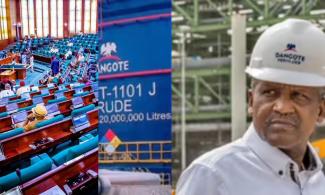
The committee revealed that it had identified 30 key items for investigation as directed by the House but wouuld initially focus on two primary concerns.
The House of Representatives' Joint Petroleum Committee on Midstream and Downstream sectors have initiated an investigation into allegations of adulterated or substandard petroleum products being produced or imported.
The committee’s inquiry will also encompass the availability of crude oil for domestic refineries and potential threats to Nigeria's energy security.
The Joint Investigative committee chaired by Hon. Ikenga Imo Ugochinyere (Downstream) with support from Hon. Henry Okojie (Midstream), at the inaugural meeting which was declared open by the Deputy Speaker Rt. Hon. Benjamin Okezie Kalu, called on all stakeholders to provide comprehensive support, including essential information and documentation.
Kalu while performing the inauguration of the committee charged them to hold dearly the sacred principles of transparency, fairness, justice and professionalism in going about their mandate.
He charged the committee to consider the interest of the Nigerian people in their investigative activities and warned them not to compromise on the core values of the 10th House of Representatives.
The Chairman of Downstream Ikenga Imo Ugochinyere who heads the Joint Investigation and Hon. Henry Okogie Chairman Midstream in their speeches at the event outlined the committees’ strategy and confirmed that hearings and submissions from stakeholders had already begun.
They urged refinery operators, importers, producers, and marketers of petroleum products to share their complaints, suggestions, and independent facts.
They disclosed that the investigation will proceed in phases, starting with the investigation of allegations of local production and importation of substandard petroleum products, as well as the critical issue of crude oil non-availability to refineries and circumstances surrounding it.
The committee revealed that it had identified 30 key items for investigation as directed by the House but wouuld initially focus on two primary concerns.
It said, "To ensure a thorough examination, the committee plans to: Conduct laboratory investigations at all local refineries, marketer and importer facilities, and regulatory agency labs such as the Nigerian Midstream and Downstream Petroleum Regulatory Authority (NMDPRA), Visit various filling stations of different marketers, importers' depots, and other relevant sites to collect samples for analysis.
"These samples will be examined in their labs, and also in alternative private independent labs to ascertain sulfur levels and other critical components.
“The committee will hire an internationally certified lab and where possible conduct live testing of all imported and locally produced products to help resolve the issues. The results of such testing on all imported and produced petroleum products, will be announced publicly.
"The committee affirmed that apart from finding a final solution to the alleged embarrassing issue of non-availability of crude supply to domestic refiners both modular and big refiners, the findings will stretch to crude produced and the quantity that ought to go to local refiners and the reasons for falling short, the impact of crude forward sales on availability of crude to domestic refiners and other issues."
The lawmakers said that letters of invitation for paper submissions and appearances have been dispatched to key stakeholders, including the Minister for Petroleum (Oil), the management of NNPCL, the GCEO Mele Kyari, Executive Vice President Downstream, and Authority Chief Executive of NMDPRA, Operations Officers, and their lab heads or testing partners.
Others include IPMAN, PETROAN, NUPRC, independent oil producers, international oil companies (IOCs), importers, marketers, and depot owners.
A dispute has arisen between the Dangote Group founded by Africa’s richest individual, Aliko Dangote and the Nigerian Midstream and Downstream Petroleum Regulatory Authority (NMDPRA) regarding the quality of diesel fuel in Nigeria.
Last month, Devakumar Edwin, vice president of oil and gas at the Dangote Group, alleged that the NMDPRA permitted the importation of substandard fuel.
In response, Farouk Ahmed, chief of NMDPRA, claimed that diesel from Dangote's refinery, as well as from other sources, contained high sulphur levels, exceeding the West African standard.
However, during a recent tour of the Dangote Petroleum Refinery and Dangote Fertiliser Limited complex by members of the House of Representatives, Dangote refuted these claims, citing lab tests showing a sulphur content of 87.6 ppm in their diesel.
He invited the regulator to conduct an impartial comparison of the quality of refined products from his refinery and imports.
On Saturday, Dangote also announced plans to halt his investment in Nigeria’s steel industry to avoid accusations of monopoly.
Since commencing operations in January, Dangote Refinery has faced challenges in securing adequate crude supplies in Nigeria, despite the country being Africa's largest oil producer.
Nigeria's oil industry is grappling with issues such as theft, pipeline vandalism, and low investment.
As a result, Dangote Refinery has been forced to import crude from countries like Brazil and the United States.
Follow the Sahara Reporters channel on WhatsApp: https://whatsapp.com/channel/0029VaFClvtH5JM6SSsP7M2Y